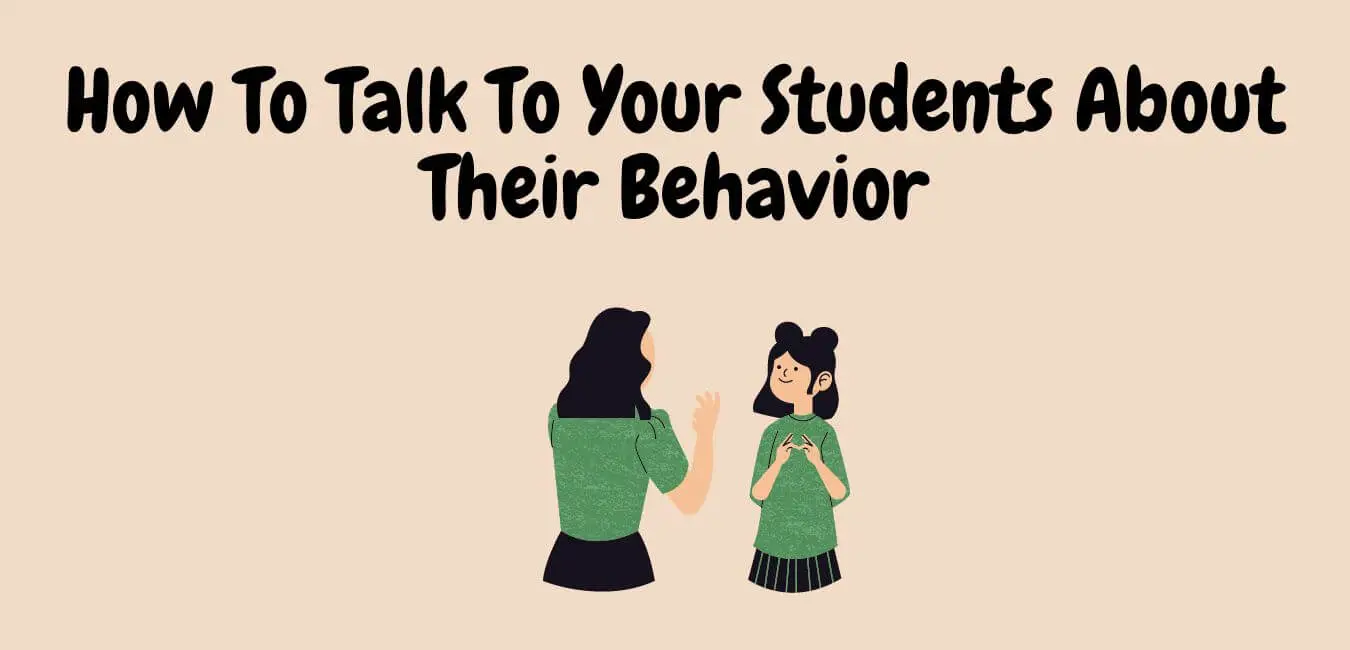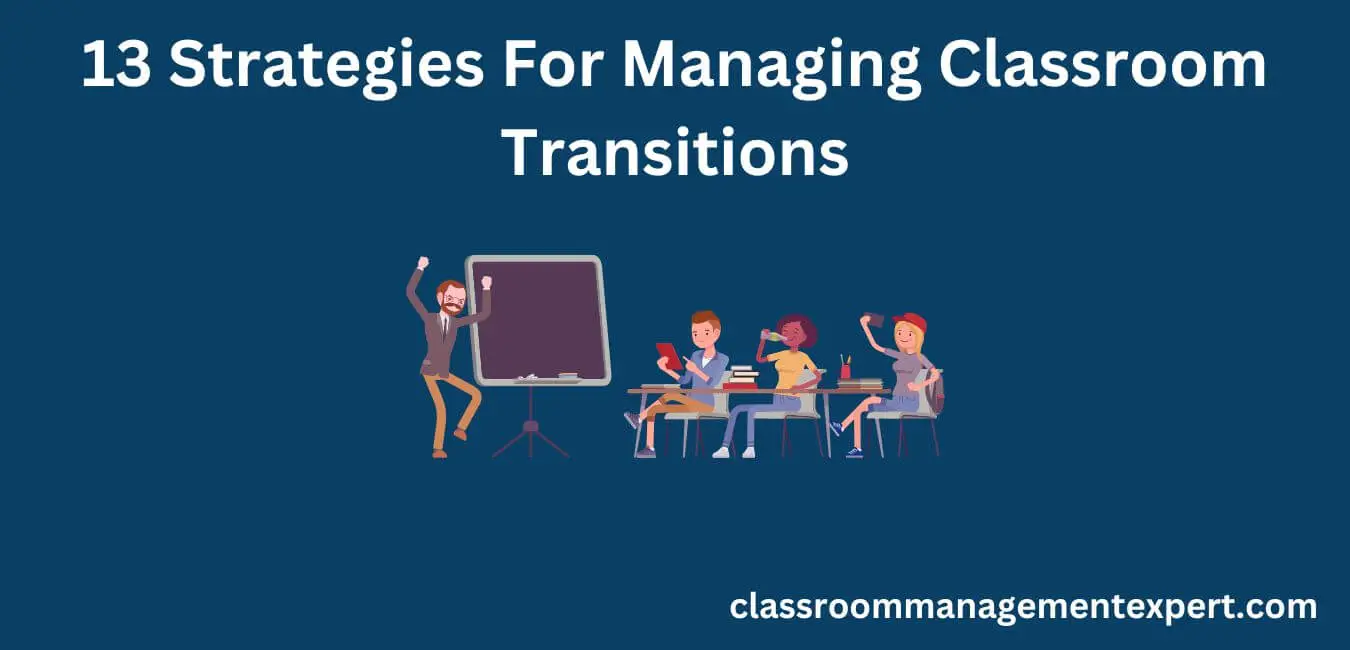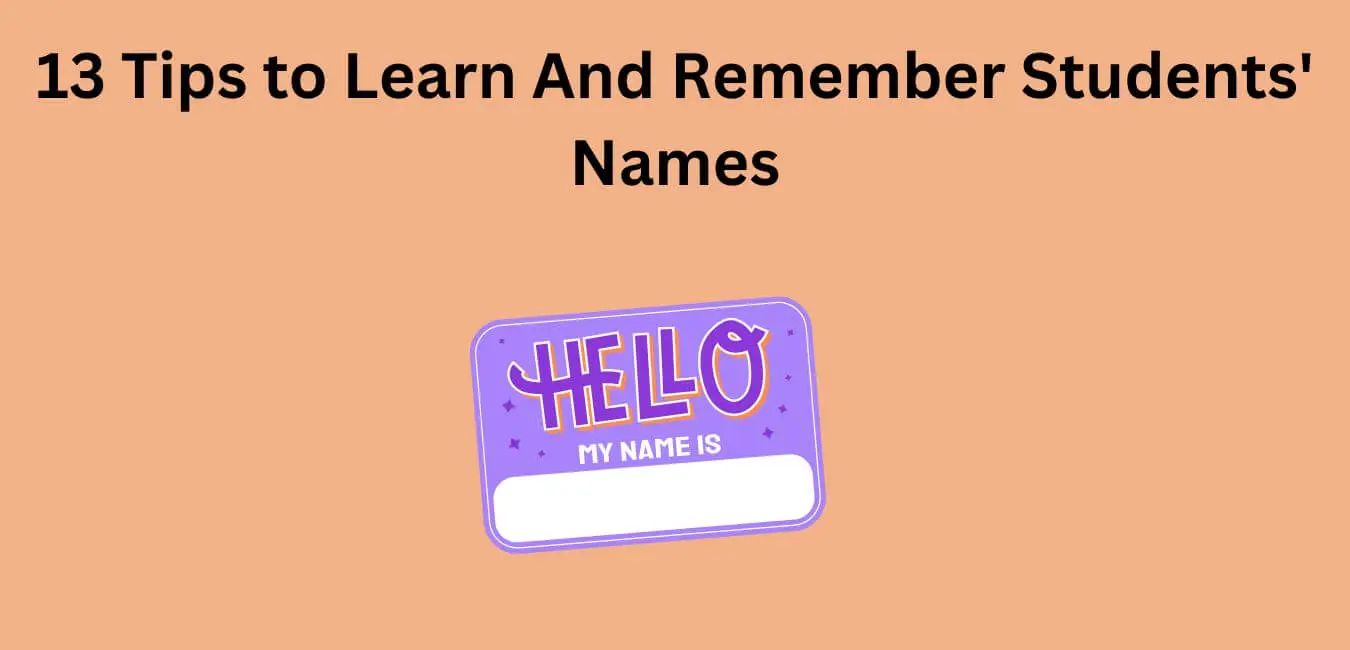As a teacher, one of the most important things you can do is create a safe and positive learning environment for your students. However, sometimes students can exhibit disruptive or inappropriate behavior.
In this post, I will outline seven reasons why you should talk to your students about their behavior, as well as provide some tips on how to effectively do so.
I hope this will help you to create a positive learning environment for your students, and help to ensure that they behave in a respectful and appropriate manner.
Why Should You Talk to Your Students about Their Behavior?
1. To Set Boundaries
When teachers talk to their students about their behavior, it helps the teachers to set boundaries in the classroom.
By talking to the students about their behavior, the teachers can let the students know what is acceptable and what is not acceptable in the classroom.
This helps the teachers to keep the classroom organized and running smoothly.
2. To Teach Responsibility
When teachers take the time to talk to their students about their behavior in the classroom, it helps the students to understand what is expected of them and why certain behaviors are not allowed.
This understanding can lead to more responsible behavior from the students.
Additionally, when students are held accountable for their actions and are given clear consequences for their choices, they are more likely to act responsibly.
You may want to get more information on how to teach your students to be responsible. This is why I have created this article to help you out.
3. To understand why they are behaving the way they are.
When you talk to your students about their behavior, it gives you insight into why they might be behaving the way they are.
It could be that they are acting out because they are struggling with something at home, or they might be trying to get attention because they feel like they are not being heard.
Whatever the reason, talking to your students about their behavior can help you to understand why they are behaving the way they are and how you can best support them.
4. To help them understand why their actions might have negative consequences.
Talking to your students about their behavior helps them understand why their actions might have negative consequences.
It gives them a chance to see the situation from your perspective and to understand why you might be upset or concerned about their actions.
It also allows them to think about how their actions might affect others and to see the potential consequences of their actions.
This can help them make better choices in the future and avoid negative consequences.
5. To help them learn how to better manage their emotions.
Talking to your students about their behavior can help them to understand and manage their emotions in the classroom.
When students feel comfortable discussing their emotions with their teacher, they are more likely to feel comfortable managing them in the classroom.
This can help to create a more positive and productive learning environment for all.
6. To help them learn how to better communicate with others.
When you talk to your students about their behavior, it helps them learn how to better communicate with others in the classroom.
By discussing their behavior with them, you are teaching them how to express themselves and their needs to others.
This is an important skill for them to learn, as it will help them in all aspects of their lives.
You can learn more about how to promote open communication in your classroom here.
7. To help them learn how to better manage their time.
When you talk to your students about their behavior, it helps them learn how to manage their time better in the classroom.
You can help them understand how to budget their time wisely, how to make the most of their class time, and how to avoid wasting time.
By talking to your students about their behavior, you can help them learn how to better manage their time in the classroom.
Check out other ways to help your students manage their time well here.
Things to Avoid When Talking to Your Students About Their Behavior in the Classroom
1. Not listening to your students.
2. Getting angry at your students.
3. Not taking students seriously.
4. Not addressing specific behaviors.
5. Getting emotional.
6. Not following up with your students.
Tips to Help You Talk to Your students about their behavior in the classroom
1. Choose the right time to talk. Make sure you are both relaxed and have enough time to talk.
It is important to choose the right time to talk when planning to talk to your students about their behavior for a few reasons.
First, you want to make sure you are both relaxed and have enough time to talk. This will help ensure that the conversation is productive and respectful.
Second, choosing the right time will help ensure that your students are receptive to what you have to say. If you try to talk to them about their behavior when they are already feeling stressed or frustrated, they are likely to tune you out or become defensive.
However, if you choose a time when they are relaxed and open to communication, they are more likely to listen to what you have to say and be willing to work on their behavior.
2. Be clear about what behavior you want to talk about.
It is important to be clear about what behavior you want to talk about when talking to your students about their behavior in your classroom for several reasons.
First, if you are not clear about what behavior you want to eliminate, your students may become confused and not understand what you are trying to communicate.
Additionally, if you are not clear about what behavior you want to stop, you may inadvertently end up talking about something that is not related to the behavior you actually want to address.
Finally, if you are not clear about what behavior you want to talk about, your students may feel as though you are not really addressing their behavior in a meaningful way.
By being clear about what behavior you want to talk about, you can avoid all of these potential problems and ensure that your conversation with your students about their behavior is productive and effective.
3. Avoid accusations and blame.
It is important to avoid accusations and blame when talking to your students about their behavior in your classroom so that you can maintain a positive and productive relationship with them.
If you accuse or blame your students for their behavior, they are likely to become defensive and may be less likely to listen to what you have to say.
Furthermore, by avoiding accusations and blame, you can set a positive tone for the conversation and show your students that you are willing to work with them to improve their behavior.
4. Listen to your students’ point of view.
It is essential to listen to your students’ point of view when discussing their behavior in your classroom for several reasons.
First, students are more likely to be open and honest about their behavior if they feel like they are being listened to.
Secondly, by understanding your students’ point of view, you can help to address any underlying issues that may be causing disruptive behavior.
Lastly, listening to your students’ point of view shows that you respect them and value their input. Ultimately, by taking the time to listen to your students, you can create a more positive and productive learning environment for everyone involved.
5. Explain your own point of view calmly and clearly.
It is important to explain your own point of view calmly and clearly when talking to your students about their behavior in your classroom for several reasons.
First, if you are calm and clear in your explanation, it will help the student to understand what you are saying and why you are saying it.
Second, if you are calm and clear in your explanation, it will help to de-escalate the situation and prevent the student from becoming more upset or agitated.
Finally, if you are calm and clear in your explanation, it will help to build trust and rapport with the student, which is important for maintaining a positive and productive learning environment.
6. Respect your students’ opinions, even if you don’t agree with them.
It is important to respect your students’ opinions, even if you don’t agree with them, because they are individuals with their own thoughts and feelings.
If you dismiss their opinions out of hand, they may feel that their thoughts and feelings are not valid, which could lead to them feeling devalued and unimportant.
Additionally, if you are not respectful of their opinions, they may be less likely to be respectful of yours. It is important to create a respectful and open environment in your classroom where all students feel that their opinions are valued.
Check out more information on how to respect your students here.
7. Avoid making threats or ultimatums.
Threats and ultimatums are not effective in communicating with students about their behavior in the classroom. These types of communication can often escalate the situation and make the student feel defensive.
It is important to avoid making threats or ultimatums, and instead focus on positive and constructive communication.
8. Try to find a compromise or solution that works for both of you.
It is important to try to find a compromise or solution that works for both of you when talking to your students about their behavior in your classroom because it shows that you are willing to work with them to find a solution that is acceptable to both of you.
This can help to build trust and rapport with your students, and can also help to prevent or resolve conflict. For example, if your student is often talking out of turn, it may be helpful to give them some suggestions for how they can limit their speaking time without being punished.
In the same way, if your student is behaving aggressively or disruptive, it may be helpful to offer them some tips on how to behave in a more appropriate manner.
By working together, you can help to ensure that your students are able to learn in an environment that is conducive to their success.
9. Agree on a plan of action for the future.
It is important to agree on a plan of action for the future when talking to your students about their behavior in your classroom so that they know what is expected of them and can be held accountable for their actions.
This will help to create a more positive and respectful classroom environment. For example, you might decide to have students write down their goals for the semester or week ahead, or set specific times for when they will be completing homework assignments.
By having a plan in place, you can ensure that everyone is on track and that any problems can be addressed quickly and efficiently.
10. Follow up after the conversation to make sure things are going well.
It is always important to follow up with your students after a conversation about their behavior in your classroom. This helps to ensure that they are understanding what is expected of them and that they are following through with the changes that were discussed.
Additionally, following up gives you the opportunity to address any new issues that may have arisen since the last conversation.
By staying in communication with your students, you can help create a positive and productive learning environment for everyone in your class.
11. Be prepared to talk about your own behavior.
It is important to be prepared to talk about your own behavior when talking to your students about their behavior in your classroom because you are the role model for your students.
Your students will look up to you and follow your lead, so it is important to set a good example. If you are not prepared to talk about your own behavior, your students may not be as receptive to hearing about their own behavior.
12. Avoid making assumptions about your students’ behavior.
It is important to avoid making assumptions about your students’ behavior when talking to your students about their behavior in your classroom for several reasons.
First, making assumptions can lead to misunderstandings. Second, students may behave differently outside of your classroom, so you may not have an accurate picture of their behavior.
Finally, students may be reluctant to talk about their behavior if they feel like you are making assumptions about them.
13. Be aware of your own body language and tone of voice.
It is essential to be aware of your own body language and tone of voice when talking to your students about their behavior in your classroom.
Your students will take their cues from you, and if you are tense or angry, they will likely respond in kind.
It is important to remain calm and collected when discussing behavioral issues with your students, so that they understand that you are in control of the situation and are not upset with them personally.
14. Respect your students’ privacy.
It is important to respect your students’ privacy when talking to them about their behavior in your classroom for a few reasons.
First, it is a matter of basic respect. Your students are individuals with their own thoughts, feelings, and experiences, and they deserve to be treated with respect.
Second, if you do not respect your students’ privacy, they may not trust you with important information. If your students feel like they can’t trust you to keep things private, they may not feel comfortable confiding in you about things that are going on in their lives.
Finally, respecting your students’ privacy shows that you value their individual rights and autonomy. This can create a more positive and productive learning environment for everyone involved.
15. Seek professional help if the problem is serious or you feel out of your depth.
It is very important to seek professional help if you are having serious difficulties communicating with your students or if you feel out of your depth when trying to address their behavior in your classroom.
Trying to manage these things on your own can be incredibly overwhelming and can actually make the situation worse.
A professional can help you to develop a plan to address the issue and can provide support and guidance as you implement it.
They can also offer valuable insights and perspectives that you may not have considered. Ultimately, seeking professional help can make a big difference in how effectively you are able to manage your classroom and your students’ behavior.
Conclusion
Talking to your students about their behavior is an important part of building a positive relationship with them. By following these seven tips, you will be able to talk to students about their behavior in a way that is effective and helpful.



















